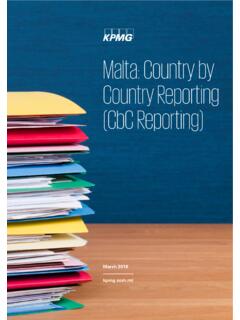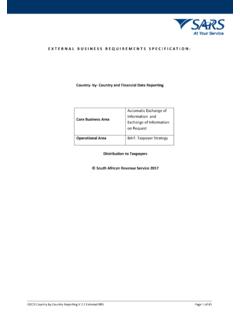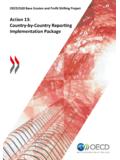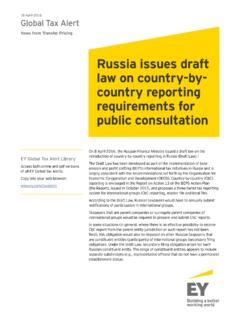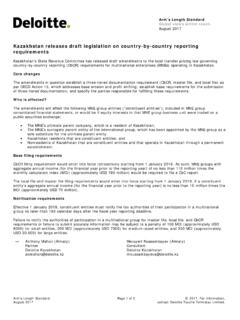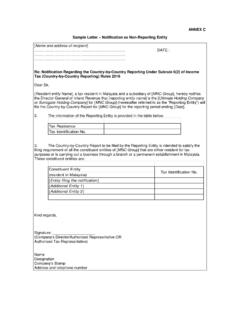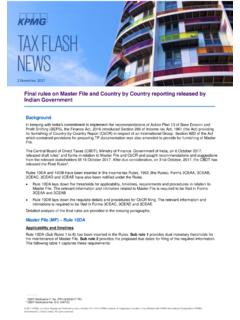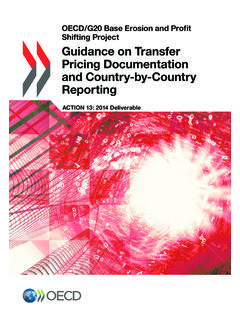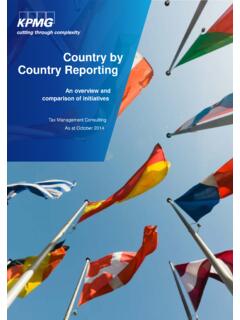Transcription of COUNTRY BY COUNTRY REPORTING: BETWEEN …
1 1 COUNTRY BY COUNTRY reporting : BETWEEN OECD RULES AND THE EU PROPOSAL COUNTRY BY COUNTRY reporting : BETWEEN OECD RULES AND THE EU PROPOSAL The EU at the forefront of a transparency battle? INTRODUCTION The 'Panama Papers' and 'LuxLeaks revelations (..) have shown the urgent need for the EU and its Member States to fight tax evasion, tax avoidance and aggressive tax planning, and to act for increased cooperation and transparency in order to re-establish tax justice, by making our tax systems fairer and ensuring that corporate taxes are paid where value is created, not only among Member States, but also globally . This quote from a European Parliament resolution of 20161 explicit the current state of play regarding tax evasion, this issue having acquired even more importance with the 2017 Paradise Papers scandal2. Vocabulary is important in these fields: aggressive tax planning can be described as the practice of taking profit of inconsistencies generated by the existence of divergent national tax regulation; profit shifting can be defined as an allocation of income BETWEEN entities of the same group in order to lessen the tax liability of this group.
2 The following table shows the cost of both practices, according to the European Parliamentary Research Services. Estimated losses due to profit shifting 50-70 billions Estimated losses due to aggressive tax planning 160-190 billions 1. Action 13 of the BEPS program and its application in Europe 1 Resolution of 6 July 2016 on tax rulings and other measures similar in nature or effect ( +TA+P8-TA-2016-0310+0+DOC+XML+V0//EN ) 2 See, for example: Transparency is the first weapon in our armory. It s the one that will allow us to stop a culture of secrecy, and a feeling of impunity of people who are carrying out tax avoidance (European Commissioner for Economic and Financial Affairs Moscovici) Mauro BARONTI Marine BOULLENGER Charles MANOURY 2 COUNTRY BY COUNTRY reporting : BETWEEN OECD RULES AND THE EU PROPOSAL The OECD and G20 Base Erosion and Profit Shifting (BEPS) action plan gave, in 2015, an important impulsion at international level.
3 15 actions were identified in order to fight base erosion and profit shifting. The program has gathered over 100 countries and can be considered an important step, but it is still, for the major part, soft law. In June 2015 the Commission adopted a comprehensive list of initiatives in its Action Plan on a Fairer Corporate Tax System3 and released a subsequent Anti-Tax Avoidance Package4 (ATAP) in January 2016, which, in accordance with action 13 BEPS, requires large multinational companies to report to national tax administrations key information on where they make their profits and where they pay their tax in the EU on a COUNTRY -by- COUNTRY basis. This should enable better compliance with tax laws. Directive 2016/8815, adopted on 25 May 2016, introduces into EU legislation action 13 BEPS, and sets up an automatic information exchange system. The report is sent by the group to the relevant tax administration (depending on the structure of the group) that should transmit it to the tax administration of each COUNTRY where the group is a legal tax resident.
4 These transparency requirements will apply to any multinational company - whether European or not that fulfils the following requirements 3 4 5 The results of the implementation of Action 13 BEPS More than 1400 relationships for the exchange of CbC reports activated: BETWEEN the 68 jurisdictions that are signatories to the CbC multilateral competent authority agreement; BETWEEN the 28 EU Member States under European Council Directive 2016/881/EU; BETWEEN jurisdictions that have bilateral qualifying competent agreements in effect (including bilateral arrangements BETWEEN the US and 31 jurisdictions). Multinational Enterprises to which the EU rules apply: currently active in the EU single market; with a permanent presence in the EU; global revenues exceeding 750 M / year companies affected 3 COUNTRY BY COUNTRY reporting : BETWEEN OECD RULES AND THE EU PROPOSAL 2.
5 The bold EU transparency move outside the OECD well-trodden path: a controversial step forward public scrutiny? In April 2016, the European Commission proposed a Directive6, modifying Directive 2013/34 EU ( Accounting Directive ), going further than the action 13 BEPS. The new proposal sets up a public COUNTRY by COUNTRY reporting that will have a different aim than the one received by the tax authorities. Setting a mandatory public COUNTRY -by- COUNTRY reporting enables citizens to scrutinize the tax behaviour of MNEs, with the hope of encouraging companies to pay the taxes where they make their profit. When it comes to public disclosure, it is important that EU citizens get information about where in the EU the companies are paying taxes. Citizens also have a legitimate interest in knowing whether companies active in the EU are also active in so-called tax havens. However, a conflict may arise BETWEEN the principle of transparency and the need for companies to protect their industrial secrets.
6 As stressed by the European Commission in its communication of 18 June 20157, greater transparency requirements without sufficient safeguards may run the risk of sensitive business information being publicized. This could be detrimental to companies, especially if their competitors outside the EU are not following suit. These concerns had already been highlighted by businesses and industrial association that responded to the public consultation on Further corporate tax transparency run by the Commission BETWEEN June and September 20158. - A possible dilemma - Risks: Demanding publicly disaggregated data for all third countries could affect companies' competitiveness and divulge information on key strategic investments in a given COUNTRY ; The disclosure of turnover and purchases within a group poses a threat to multinationals in that it could divulge key information to competitors; Exposure of business strategy of EU firms; Distorted competition undermining the success of European multinationals, especially vis-a -vis US firms given the obligation to disclose part of their commercial strategy; Loss of tax revenue for Member States; Deterioration of relations BETWEEN Europe and the tax administrations of third countries; Reputational damage to European companies as the publication of raw data can lead to erroneous interpretations.
7 6 7 8 Possible conflicts BETWEEN national and EU level the case of France In the context of the implementation of action 13 BEPS, the French legislator had proposed to introduce a public COUNTRY by COUNTRY reporting . However, the Constitutional Court has considered that it was a disproportionate infringement of entrepreneurial freedom. However, former French minister of finance, Michel Sapin, shows the will to continue the fight against tax evasion despite the decision of the Constitutional Court. He indeed declared that the directive would allow to constitutionalize a provision that was not before in compliance with the primacy principle. 4 COUNTRY BY COUNTRY reporting : BETWEEN OECD RULES AND THE EU PROPOSAL Benefits: increased accountability and help to restore public trust in large companies; increased revenue from income tax, levelling the playing field BETWEEN MNEs and SMEs; authorities in developing countries could have access without having to implement a burdensome exchange system; improved information to a wide range of stakeholders, thereby strengthening efforts to monitor corporate governance and responsibility, tax payments, and potentially corrupt practices; investors would be provided with more details about business activities on a geographical basis, helping them to assess risks arising from aggressive tax planning.
8 Public interest groups and investigative journalists to verify whether companies are paying their share of tax in the countries where they do business, especially where tax authorities have a lack of capacity, so enabling third party analysis for governments; It is clear that the risks and benefits need to be carefully weighed up when considering whether next steps might be necessary. However, one can also notice that the fear of the divulgation of industrial secrets may be overestimated, as it is unlikely that big and resourceful multinationals don t know already the tax practices of their direct competitors. Moreover, the argument regarding the competitive disadvantage for EU companies should be nuanced. The Commission proposal is balanced, as it provides an obligation to report not only to EU companies but also to large multinational having substantial operations in the EU. The Commission proposal is yet to arrive at the interinstitutional negotiations phase, as there is a conflict BETWEEN the Parliament and the Council of the European Union on its legal basis: according to the Parliament, the legal basis should be art.
9 50 of TFEU (internal market issue) while for the Council it should be 115 TFEU (tax issue). The matter is crucial, as art. 50 would simply require a qualified majority in the Council, while art. 115 would require unanimity (making the legislative path far more arduous and subject to vetoes). This institutional dispute shows well how this topic is sensitive and the number of interests at stake. 3) Legislative analysis on the adjunction of omission exception It has to be noted that the co-legislator changed several points in regard to the Commission s proposal, one of the most important being the omission exception allowing the companies not to reveal sensitive commercial information s in the disclosure report and only disclose them 4 years later in a later report. This clause has been criticized given the vagueness of the definition of the commercially sensitive information creating a loophole that companies may take advantage off to escape their transparency obligation.
10 In fact, Philippe Lambert (co-chair of the Green party) explicated that competitiveness (that may be harmed in case that information is revealed to the public) equals in fact to the reputation of the companies. Indeed, by delivering raw data, companies may be exposed to public and consumers misunderstanding. Finally, both legislators (council of the EU and the European parliament) advocate for this clause. The only difference is the discretion let to the Member State to authorize companies to apply omission or not. The European parliament would like to open the possibility for the member states to apply it and if so companies would have to ask for permission to the relevant member state, which in turn would have to notify the Commission. On the other hand, the Council goes only halfway by generalizing the omission possibility without any scrutiny from the European Commission.

